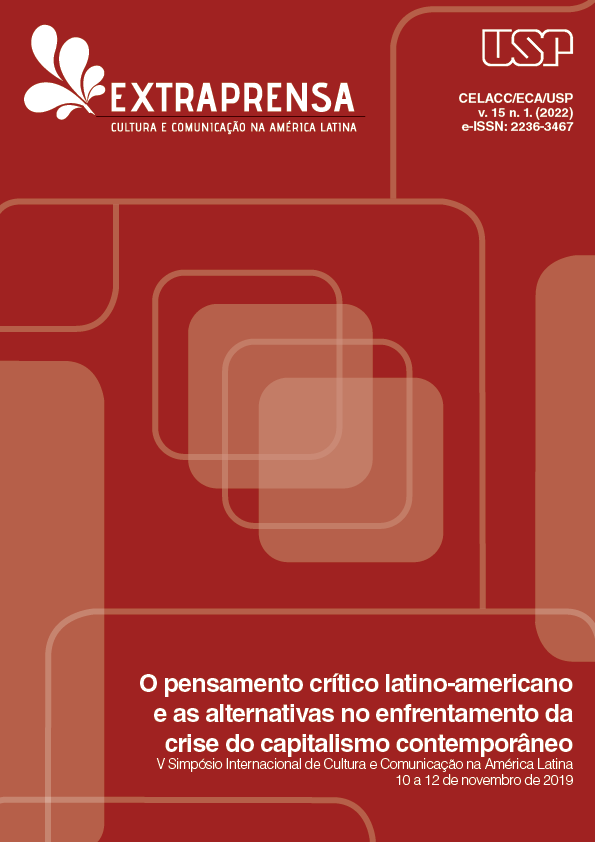Black perspectives that enunciate voices and educate: Hip-Hop feminism, the politics of survival and empowerment in the favela
DOI:
https://doi.org/10.11606/extraprensa2022.193404Keywords:
Feminismo hip-hop, Pedagogía hip-hop, Pensamiento de las mujeres negras, Mujer de favela, Educación antirracistaAbstract
Faced with the difficulties found in the current educational system, we will sow seeds for a new future, highlighting the potential of a living education, between life, art and knowledge, present in the favela, as a body-territory that has been reconfigured by the young women's movement and its new languages. Hip-Hop (USA), Funk (Brazil) and Slam (USA) are sociocultural, political and educational movements that have contributed to the refavela movement. The idea is to decode the grammar of these movements, proposing a reading of these new times in order to contribute with a new lexicon (Cf. SILVA, 2018), to be traced from the struggle of black women in the face of transmuting historical and sexual oppression through art, to analyze to what extent the emancipated search for the voice, with its dynamics and nuances, subverts the current modus operandi, which are imbricated in the intersection between the politics of survival, self-definition and the politics of empowerment.
Downloads
References
ACOSTA, Maria. P. T. Construções discursivas de reexistência: um estudo em análise de discurso crítica sobre marchas de mulheres no Brasil. Tese de Doutorado. Universidade de Brasília, 2018, p. 27.
ASANTE, Mulef K. (1988, 2003). Afrocentricidade: a teoria de mudança social. Tradução de Ana Ferreira e Ama Mizani. Afrocentry Internacional, 2014, 193 p.
BERNARDINO-COSTA, Joaze; MALDONADO-TORRES, Nelson; GROSFOGUEL, Ramón. (Org.). Decolonialidade e pensamento afrodiaspórico. 2. ed. Belo Horizonte: Editora Autêntica, 2020.
COLLINS, Patricia Hill. From Black Power to Hip Hop: racism, rationalism, and feminism (Politics History & Social Chan). Temple University Press, 2006.
COLLINS, Patricia Hill. Pensamento feminista negro: conhecimento, consciência e política do empoderamento. Trad. Jamille Pinheiro Dias. São Paulo: Boitempo, 2019.
COLLINS, Patricia Hill. Epistemologia feminista negra. In. BERNARDINO-COSTA, Joaze; MALDONADO-TORRES, Nelson; GROSFOGUEL, Ramón. (Org.). Decolonialidade e pensamento afrodiaspórico. 2. ed. Belo Horizonte: Editora Autêntica, 2020.
DAVIS, Angela. Mulheres, raça e classe. Tradução: Heci Regina Candiani. São Paulo: Boitempo, 2016.
EVARISTO, Conceição. Becos da memória. Rio de Janeiro: Pallas, 2017.
FANON, Fanon. Pele negra, máscaras brancas. Salvador: EDUFBA, 2008.
HUDSON-WEEMS, C. Mulherismo Africana: recuperando a nós mesmos. Trad. Wanessa A. S P. Yano. São Paulo: Editora Ananse, 2020.
JESUS, Carolina Marida de. Quarto de Despejo: diário de uma favelada. São Paulo: Ática, 2014.
KILOMBA, Grada. Memórias da plantação: episódios de racismo cotidiano. Tradução de Jess Oliveira. Rio de Janeiro: Editora Cobogó, 2019.
MEIRELLES, Renato & ATHAYDE, Celso. Um país chamado favela: a maior pesquisa já feita sobre a favela brasileira. São Paulo: Edita Gente, 2014.
MORGAN, Joan. When Chickenheads Come Home to Roost: A Hip Hop Feminist Breaks it Down. Simon & Schuster, 1999.
NASCIMENTO, Eliza. L.; GÁ L. C., org. Adinkra: sabedoria em símbolos africanos. Rio de Janeiro: Pallas, 2009.
NASCIMENTO, Beatriz. Todas (as) distâncias: poemas, aforismos e ensaios de Beatriz Nascimento. Organizado por Alex Ratts e Bethânia Gomes; ilustrado por Iléa Ferraz e revisado por José Henrique de Freitas Santos. Salvador: Editora Ogum’s Toque Negros, 2015, p.32.
NASCIMENTO, Maria Beatriz. Quilombola e intelectual: Possibilidade nos dias da destruição. São Paulo: Editora Filhos da África, 2018.
OSUMARÉ. H. Marginalidades conectivas do hip hop e a diáspora africana: os casos de Cuba e do Brasil. In: AMARAL, M. G. T. do; CARRIL, L. O Hip Hop e as Diásporas Africanas na
Modernidade: Uma discussão contemporânea sobre cultura e educação. São Paulo: Alameda, 2015, p. 63-92.
OYEWÙMÍ, Oyèrónke. Conceitualizando gênero: fundação eurocêntria de conceitos feministas e o desafio das epistemologias africanas. In. BERNARDINO-COSTA, Joaze; MALDONADO-TORRES, Nelson; GROSFOGUEL, Ramón. (Org.). Decolonialidade e pensamento afrodiaspórico. 2. ed. Belo Horizonte: Editora Autêntica, 2020.
OYEWÙMÍ, Oyèrónke. A invenção das mulheres: construíndo um sentido africano para os discursos ocidentais de gênero. Trad. wanderson flor do nascimento. Rio de Janeiro: Bazar do Tempo, 2021.
RATTS, Alex. Eu sou atlântica: sobre a trajetória de vida de Beatriz Nascimento. São Paulo: Imprensa Oficial/Instituto Kuanza, 2006.
SILVA, Jamile B. Prefácio. In: AMARAL, Mônica, et al. Culturas Ancestrais e Contemporâneas na Escola: novas estratégias didáticas para a implementação da lei 10.639/2003. São Paulo: Alameda, 2018.
Websites consultados
Mel Duarte. Mormaço – Entre outras formas de calor. Saudação. 2020. Faixa 1 (4min23seg) https://www.youtube.com/watch?v=5_LbnoB5gi4&list=PLZ8YZlRqCqiVnzUc1h-SWFKTMuUAE5s_A , acesso em 04 de agosto de 2021.
Mel Duarte. Mormaço – Entre outras formas de calor. Ocupação. 2020. Faixa 1 (3min38seg)
https://www.youtube.com/watch?v=AQBuyOV4B0o, acesso em 04 de agosto de 2021.
Conceição Evaristo. Exposição Ocupação Itaú Cultura. Conceito de Escrevivência. Disponível em: https://www.itaucultural.org.br/ocupacao/conceicao-evaristo/escrevivencia/ Acesso em: 30 jul. 2021.
Programação da Pinacoteca sobre a exposição de Grada Kilomba. http://pinacoteca.org.br/programacao/grada-kilomba-desobediencias-poeticas/, acesso em 31/04/2021.
Downloads
Published
Issue
Section
License
Copyright (c) 2022 Cristiane Correia Dias

This work is licensed under a Creative Commons Attribution-NonCommercial-NoDerivatives 4.0 International License.
Ao submeter qualquer material científico para Extraprensa, o autor, doravante criador, aceita licenciar seu trabalho dentro das atribuições do Creative Commons, na qual seu trabalho pode ser acessado e citado por outro autor em um eventual trabalho, porém obriga a manutenção de todos os autores que compõem a obra integral, inclusive aqueles que serviram de base para o primeiro.
Toda obra aqui publicada encontra-se titulada sob as seguintes categorias da Licença Creative Commons (by/nc/nd):
- Atribuição (de todos os autores que compõem a obra);
- Uso não comercial em quaisquer hipóteses;
- Proibição de obras derivadas (o trabalho não poderá ser reescrito por terceiros. Apenas textos originais são considerados);
- Distribuição, exibição e cópia ilimitada por qualquer meio, desde que nenhum custo financeiro seja repassado.
Em nenhuma ocasião a licença de Extraprensa poderá ser revertida para outro padrão, exceto uma nova atualização do sistema Creative Commons (a partir da versão 3.0). Em caso de não concordar com esta política de Direito Autoral, o autor não poderá publicar neste espaço o seu trabalho, sob pena de o mesmo ser removido do conteúdo de Extraprensa.







